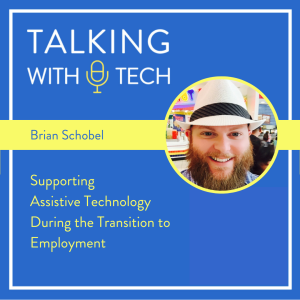
Wednesday Jan 04, 2023
Brian Schobel - Supporting Assistive Technology During the Transition to Employment
This week, we present Chris’s interview with Brian Schobel, a District Resource Teacher for Transition in Albuquerque, NM. Brian has worked for years supporting transition and employment for people with special needs. Brian reached out to interview Chris about inclusion and how technology can help students of different abilities gain meaningful employment. During the interview, Brian and Chris discuss assistive technology tools that can be used to support students as they transition to employment, as well as areas where we can improve in our support. Brian also shares about using Read & Write by TextHelp himself at work, and why being an assistive technology user inspires Brian to support others who use assistive technology.
Before the interview, Rachel and Chris have an actual in-person banter session at an airport in Minnesota! Rachel and Chris were recently presenting at the PATINS Access to Education conference in Indiana, and they jumped at the opportunity to record a podcast banter while waiting for their next flight. Rachel had two presentations at the PATINS conference. The first presentation was with Elisa Wern and covered using screen recording tools to support students. Elisa compared the tools Screencastify, Screencast-o-matic , and Loom, while Rachel discussed how she uses screen recording for asynchronous learning and coaching. Rachel’s second presentation was about on taking a team-based approach to AAC assessment through an abbreviated version of her AAC Ally course (https://rachelmadelslp.thinkific.com/courses/AAC-ally). Chris presented four time at PATINS, including presentations on inclusive coding for robots, ways to enhance AAC implementation, and combining core words with morphemes (e.g. “corephemes”). Chris also did a Wonderfully Inclusive Scavenger Hunt and ran a session where they played Cards against Exclusivity at the conference.
Key ideas this week:
🔑 Locking students into a particular browser for testing that doesn’t allow extensions related to assistive technology can be a significant issue. Even if we include voice to text and text to voice software on the test, if it isn’t the same buttons and voices that the student is used to, which can put them at a disadvantage.
🔑 You can provide both a traditional and more accessible option when assigning work in the classroom. For example, you can give a traditional paper-and-pencil worksheet to some students while also providing a digital copy to students who need it for text-to-speech. Even better, you can avoid giving a worksheet at all and provide something more interesting and meaningful while also being inclusive.
🔑 Saying “laptops closed and phones away” in a classroom can be ableist, because not everyone who is using technology is using it as a distraction. Everyone loses attention at times, even if you are looking at someone, your mind can wander. We want to give students the chance to make mistakes and to deal with distractions appropriately rather than taking all technology away from them.
🔑 How can we help places of employment adopt the same inclusive tools we are encouraging in the classroom? Companies are becoming more flexible with working remotely - we should help companies see the benefits of also being flexible supporting technological accommodations.
Visit talkingwithtech.org to access previous episodes, resources, and CEU credits that you can earn for listening to TWT episodes!
Help us develop new content and keep the podcast going strong! Support our podcast at patreon.com/talkingwithtech!
No comments yet. Be the first to say something!